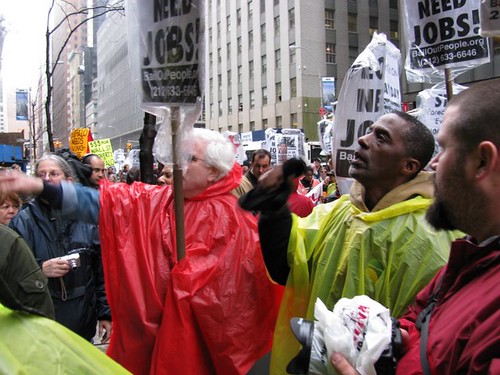
Demonstration organized by the Bail Out the People Movement (BOPM) outside Bank of America on April 3, 2009 in New York City. (Photo: Alan Pollock), a photo by Pan-African News Wire File Photos on Flickr.
March 29, 2011
As Economy Sputters, a Timid Fed
By DAVID LEONHARDT
New York Times
WASHINGTON
Whenever officials at the Federal Reserve confront a big decision, they have to weigh two competing risks. Are they doing too much to speed up economic growth and touching off inflation? Or are they doing too little and allowing unemployment to stay high?
It’s clear which way the Fed has erred recently. It has done too little. It stopped trying to bring down long-term interest rates early last year under the wishful assumption that a recovery had taken hold, only to be forced to reverse course by the end of year.
Given this recent history, you might think Fed officials would now be doing everything possible to ensure a solid recovery. But they’re not. Once again, many of them are worried that the Fed is doing too much. And once again, the odds are rising that it’s doing too little.
Higher oil prices, government layoffs, Japan’s devastation and Europe’s debt woes are all working against the recovery. Already, a prominent research firm founded by a former Fed governor, Macroeconomic Advisers, has downgraded its estimate of economic growth in the current quarter to a paltry 2.3 percent, from 4 percent. The Fed’s own forecasts, notes that former governor, Laurence Meyer, “have been incredibly optimistic.”
Why is this happening? Above all, blame our unbalanced approach to monetary policy.
One group of Fed officials and watchers worries constantly about the prospect of rising inflation, no matter what the economy is doing. Some of them are haunted by the inflation of the 1970s and worry it may return at any time. Others spend much of their time with bank executives or big investors, who generally have more to lose from high inflation than from high unemployment.
There is no equivalent group — at least not one as influential — that obsesses over unemployment. Instead, the other side of the debate tends to be dominated by moderates, like Ben Bernanke, the Fed chairman, and Mr. Meyer, who sometimes worry about inflation and sometimes about unemployment.
The result is a bias that can distort the Fed’s decision-making. Just look at the last 18 months. Again and again, the inflation worriers, who are known as hawks, warned of an overheated economy. In one speech, a regional Fed president even raised the specter of Weimar Germany.
These warnings helped bring an end early last year to the Fed’s attempts to reduce long-term interest rates — even though the Fed’s own economic models said that it should be doing much more. We now know, of course, that the models were right and the hawks were wrong. Recoveries from financial crises are usually slow and uneven. Yet the hawks show no sign of grappling with their failed predictions.
It is true that the situation has become more complicated in the last couple of months. Some of the economic data has been encouraging, and inflation has picked up.
In particular, core inflation, which excludes volatile oil and food prices, has increased somewhat. (Overall inflation obviously matters more for household budgets, but core inflation matters more to the Fed, because it’s a better predictor of future inflation than inflation itself.) Over the last three months, the Fed’s preferred measure of core inflation has risen at annual rate of 1.4 percent, up from less than 1 percent last year.
Still, 1.4 percent remains low — considerably lower than the past decade’s average of 1.9 percent, the 1990s average of 2.2 percent or the 1980s average of 4.6 percent. Unemployment, on the other hand, remains high. By any standard, joblessness is a bigger problem than inflation.
There is also reason to think that inflation will fall in coming months. Rising oil prices alone aren’t enough to create an inflationary spiral. Workers also need to have enough leverage to demand substantial raises — which then forces companies to increase prices and, in turn, gives workers further reason to demand raises. In today’s economy, this chain of events is pretty hard to fathom.
Adam Posen, an American economist who’s now an official at the Bank of England, told The Guardian this week that he was so confident inflation in Britain would decline that he would resign if it did not. His analysis also applies to the United States. “Wages,” Mr. Posen said, “will be the dog that doesn’t bark.”
It’s still too soon to know what the Fed should do next. Its current plan is to let the program known as QE2 — for quantitative easing, round two — expire in June. The program started late last year, once the economy’s troubles were impossible to ignore, as an attempt to reduce long-term interest rates by buying Treasury bonds.
If the economic data improves and inflation does not drop, ending QE2 will be the right call. But if the economy continues to weaken, there will be a strong case for doing more. One option would be to buy both Treasury bonds and mortgage-backed bonds, as the Fed did during QE1, as a way to attack the double dip in the housing market.
The problem is that some Fed officials already seem to have made up their minds, regardless of the data. In their public remarks, officials continue to wring their hands about QE2 rather than prepare people for the possibility of QE3. Some hawks have gone so far as to suggest halting QE2 early.
Meanwhile, the recovery looks uncertain, and the job market remains weak. Even if job growth were to accelerate sharply in coming months, the economy would be years away from so-called full employment. But never mind that, the hawks say — rampant inflation is just around the corner.
E-mail: leonhardt@nytimes.com; twitter.com/DLeonhardt
No comments:
Post a Comment